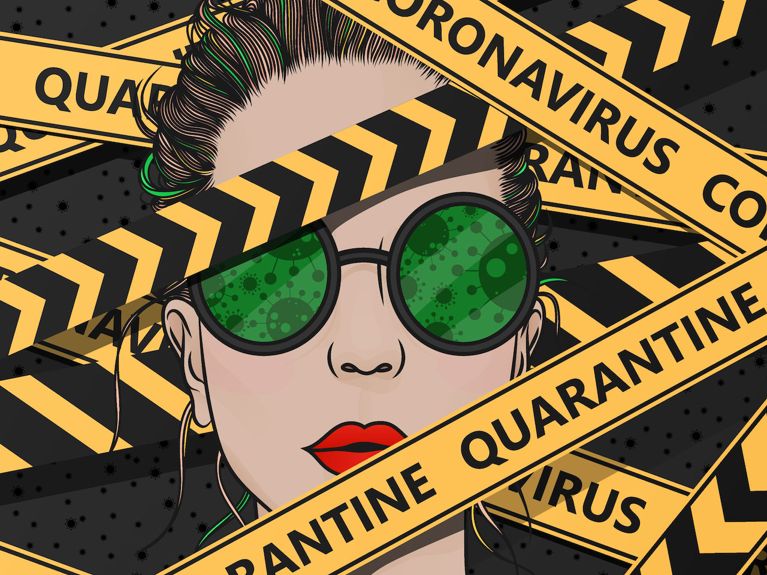What You Need To Know About Quarantining Before Visiting Loved Ones

As Canada’s COVID-19 numbers continue to surge, on November 20, Prime Minister Justin Trudeau finally said it: “a normal Christmas, quite frankly, is right out of the question.”
In the 10 months since the global pandemic began, more than 381,000 Canadians have contracted the virus and more than 12,000 have died. The Atlantic bubble has burst, with Newfoundland and Labrador and P.E.I exiting for at least two weeks in order to get case numbers under control. Nunavut, which had long had no COVID-19 cases, now has more than 120.
With increasing numbers and outbreaks, officials are reintroducing restrictions, shuttering gyms, restaurants and workplaces, and urging Canadians to curb any interactions with people outside their households. If Canadians don’t “tighten up,” as Trudeau put it, public health modelling data indicates that, under current rates of interaction, the nation could see as many as 20,000 new COVID-19 cases per day sometime this month. Increasing contacts–such as at holiday gatherings–could shoot that as high as 60,000 new cases a day.
Prior to this announcement, some Canadians reported that they were quarantining for 14 days in order to visit loved ones. But is this still a reasonable approach? Experts say the answer, like many things these days, is complicated.
“Quarantining” is the term used when an individual has no symptoms, but is halting all public contact. Common reasons why include returning from international travel, or coming into contact with a confirmed case of COVID-19. The time period is based on the incubation time of the virus, meaning the time it takes from being exposed to developing symptoms and being infectious. After 14 days of quarantine with no additional exposure and no symptoms, research indicates that an individual is unlikely to have COVID-19.
Even so, a quarantine is not a guarantee. “There's still no 100 percent safe way of doing this,” says Dr. Vanessa Meier-Stephenson, an infectious disease physician and virology researcher with University of Calgary’s Cumming School of Medicine. With the numbers climbing, even those coming from places with lower case numbers present a risk, she explains, because each traveller could be “an unknowing vector” for the virus.
“The question the traveller should ask themselves is why it is they need to travel,” she says, “and whether the benefit of their travel outweighs the risk of their spreading it to their loved ones, with the potential consequences that could entail.”
For those who do deem travel essential, a strict 14-day quarantine with certain additional precautions can make it safer.
Before going into quarantine, Dr. Meier-Stephenson recommends getting the flu vaccine, which takes two weeks to be effective, to reduce the chance of getting flu-like symptoms and conflating them with possible COVID-19. Once in quarantine, she says Canadians must “absolutely minimize the number of outside interactions.”
Opting to quarantine means more than skipping parties or get-togethers, explains Dr. Meier-Stephenson. It requires stocking up on two weeks’ worth of groceries, medications and supplies and working or studying from home.
Being outside, for instance in the backyard or to walk the dog, is fine as long as it’s possible to keep at least two metres (six feet) of distance from others. That said, Dr. Meier-Stephenson advises erring on the side of caution because things don’t always go as planned.
“We have the intention of going certain places and keeping our distances, but then things come up,” she says, such as running into a neighbour or getting stuck at a traffic crossing with other pedestrians. It comes down to being strict, says Dr. Meier-Stephenson, so that if you’re quarantining, the idea is really to stay within the controlled environment of your household.
She adds that both parties planning on visiting—say a university student and their parents—must both quarantine for the full 14 days.
With the rates of COVID-19 rising, Dr. Meier-Stephenson also emphasizes the need to keep plans flexible in case of emergency or if someone develops COVID-19 symptoms. Driving is the best method of travel, and she recommends packing food in advance and minimizing any stops along the way.
“The coming holiday season is going to be a challenging one from a mental health point of view—that can't be understated,” she says. “We have to do our best to make the decisions at the levels we can to minimize any potential harms to others.”
Quarantining is much harder than people realize, says Dr. Susy Hota, medical director of infection prevention and control at the University Health Network in Toronto.
“It can make sense if you can guarantee within that two weeks you and others in your household are able to work from home, do school from home, have grocery delivery, have medications delivered, whatever it may be,” she says. “It’s a very difficult thing for people to do well, so I think some people might be fooling themselves, to be quite honest.”
Beyond the logistics, both Dr. Meier-Stephenson and Dr. Hota urge Canadians to listen to public health officials and carefully consider the risks involved, especially given rising cases.
“Right now, the message is that things are getting out of control and various parts of the country, and particularly in the hotspot areas,” says Dr. Hota, who is worried by the impact on hospitals and long-term care that she is already seeing. “It’s really about doing the right thing in the short term so that we can get out of this.”
GET CHATELAINE IN YOUR INBOX!
Subscribe to our newsletters for our very best stories, recipes, style and shopping tips, horoscopes and special offers.